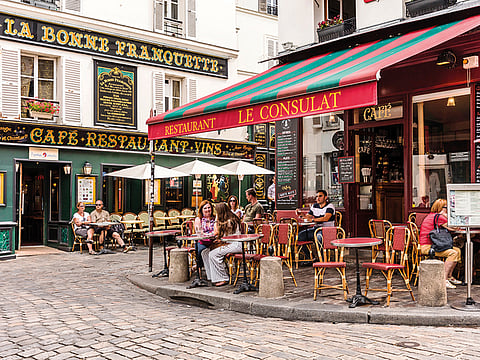Cofee, cheese and culture
The Parisian bistro, intergral to the city’s enduring legend, is being pitched as an ‘intangible cultural heritage’. Will Unesco oblige?

PARIS
In the days after terrorists massacred scores of people lounging in Paris cafés on an unseasonably warm November in 2015, Parisians defiantly returned to their neighbourhood bistros in droves to show that they would not be broken.
The hashtags #jesuisenterrace, meaning ‘I am outside,’ and #tousaubistrot, or ‘Everyone to the bistro,’ exploded on social media, as people gathered as a way to demonstrate that their way of life would continue.
‘It was a sign of their power and resilience,’ said Olivia Polski, an assistant mayor for commerce in Paris.
For many tourists and French citizens, Paris would not be Paris without its local bistros and sidewalk cafés. Whether small or sprawling, they are inseparable from the city’s iconic image — immortalised in Hollywood movies and novels.
The bistros and cafes are not just places to sip an espresso and people-watch or to have a meal. They can be arenas for robust debate, offices to seal deals or woo someone.
But are they among the world’s intangible cultural heritage? A coalition of bistro owners, unions and trade organisations is lobbying to get Unesco to grant Paris’ sidewalk bistros and cafés official status as France’s ‘intangible cultural heritage.’
For Alain Fontaine, a bistro owner and president of the association pushing the Unesco idea, the answer to the question above is an emphatic ‘yes.’
‘For centuries, they have been melting pots, places where people of different ethnicities, professions and social classes mix,’ said Fontaine, who owns Le Mesturet, an old-fashioned bistro with a zinc bar and chandeliers made of bottles.
It’s a way of life
Support for the cause has come from Parisian actors, writers and residents for whom their local cafés and bistros represent a way of life.
The bistros and cafés are not just places to sip an espresso and people-watch or to have a meal. They can be arenas for robust debate, offices to seal deals or places to woo a romantic interest.
For many who live in cramped city apartments, the cafés are an extension of home — the living room around the corner, a space both public and private.
‘I have clients who met their spouses here,’ Fontaine said. ‘I raised my children here.’
The ‘intangible cultural heritage’ label is a relatively recent addition to the basket of titles for extraordinary human and natural creations granted by Unesco, the United Nations cultural organisation.
The designation was intended to recognise practices, events and crafts that are not physical sites but that are still a unique part of a country’s cultural heritage.
The Unesco designation has occasionally drawn criticism because of the vagueness of the term and because some say it is used to promote tourism and consumption rather than to encourage the study and preservation of local traditions and practices.
Some recipients of the designation in France have been accused of being so broadly defined as to be almost meaningless — as was the case a few years ago, when the ‘French gastronomic meal’ was added to the list.
When it comes to the Paris bistros and cafés, it may be hard to explain why they should be designated part of France’s cultural heritage but not those on the Cote d’Azur or in Bordeaux.
But Fontaine and his supporters, as well as the Paris mayor’s office, which is backing the effort, point to the central role that bistros and cafés played after the 2015 attacks.
People returned to the establishments soon after the assaults, in a demonstration that in times of crisis or celebration, Parisians need their local bistros.
‘Bistros were attacked because they are symbols of French culture and life,’ Polski, the assistant mayor, said. ‘It hit us hard, because we all have treasured memories in bistros.’
Fontaine’s group is up against some tough competition in France. The ‘bouquinistes,’ sellers of old books and other printed material on the banks of the Seine, are also lobbying for the Unesco designation.
So, too, are the makers of that most recognisable of French bread, the baguette, who say it deserves the title.
But the road to protected status from Unesco can take at least a couple of years — sometimes longer. French candidates must be preselected by the Culture Ministry before being passed on to Unesco for review. Those campaigning for the bistros and cafés hope the establishments make the list in 2020.
BOX
Since 2008, when the program started, UNESCO has designated some 451 intangible cultural heritage entities in the world, and 14 are in France. Among them
an elaborate lace-making technique in Normandy.
The summer solstice fire festivals in the Pyrenees.
Folk dances in Brittany.
In other countries, the status has been awarded to:
Kabuki theater in Japan
the manufacture of batik cloth in Indonesia
The pre-Inca tradition in Peru of specialised judges who determine water rights.
Sign up for the Daily Briefing
Get the latest news and updates straight to your inbox



